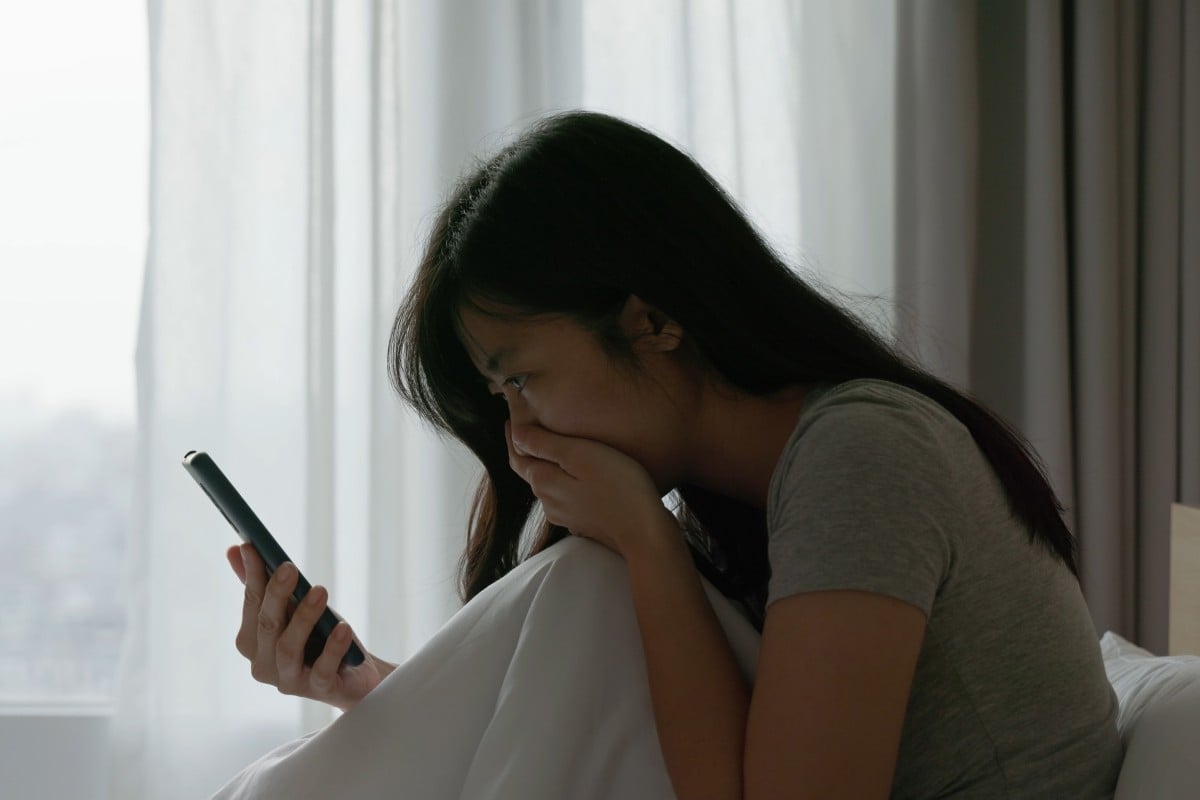
Scared about the news? Experts explain how dealing with your fear and destigmatising mental illness go hand in hand
- Amid Hong Kong’s recent violent crimes, many are anxious about safety – this reaction is normal, but it’s also crucial to change misconceptions of mental disorders
- Every week, Talking Points gives you a worksheet to practise your reading comprehension with exercises about the story we’ve written
 It might be helpful to take a break from social media since the constant updates can be overwhelming and there is a potential for misinformation to spread. Photo: Shutterstock
It might be helpful to take a break from social media since the constant updates can be overwhelming and there is a potential for misinformation to spread. Photo: ShutterstockIsaac Chau, 18, who lives near Plaza Hollywood in Diamond Hill, was shocked by the murder that took place there on June 2.
Two women were stabbed to death, but police found no evidence suggesting they had a connection to the assailant, who reportedly suffered from schizophrenia.
Isaac, a university student, said he usually visited the plaza to relax, but the incident left him feeling anxious and disturbed.
“Somewhere that you feel safe – suddenly it’s not the case any more,” he said.
A psychologist explains how to handle the mental health impacts of distressing news
Suhani Methi, 14, also expressed her worries about safety and her heightened sense of fear amid a recent series of high-profile violent crimes in the city.
“I felt pretty traumatised, and whenever I went outside, I was a lot more cautious, out of fear perhaps,” said the student from King George V School.
Young Post spoke to mental health experts about how teens are feeling in the wake of these recent events, and they shared their insight on how to address these feelings of anxiety and fear.
How to deal with your worries
Experts say it is normal for teens to feel scared and helpless after such events.
According to Adrian Low, a chartered psychologist who specialises in stress research, these incidents can trigger feelings of fear, vulnerability and loss of control.
“If the attacks are happening in their local community, teens may feel a heightened sense of danger or threat to their personal safety,” said Low, who is also president of the Hong Kong Association of Psychology.
To address this anxiety, he encouraged teens to talk to trusted friends or family members about their concerns. He also pointed out the importance of self-care.
“Practising self-care strategies such as exercise, mindfulness and spending time with friends and loved ones can help to reduce stress and promote a sense of well-being,” Low noted.
But if negative thoughts persist and have affected your daily life, you should seek help from a professional.
For Isaac, his self-care included trying to stay off social media after hearing about the murder.
“The bombardment of information about the incident could be too much to handle, and there might be potential fake information spreading,” the university student explained.
Hong Kong’s Human Library shares stories from the city’s margins
Why we need to destigmatise mental illness
Dr Ivan Mak Wing-chit, a specialist in psychiatry, emphasised the need for better education about mental illness to help address people’s fears.
He noted that the term “schizophrenia” was heavily stigmatised. In Cantonese, he suggested using 思覺失調症 which means “someone who has trouble mentally adjusting”. In English, he pointed to the term “psychotic disorders” – an umbrella term for mental illnesses in which people experience a break from reality.
He said: “It represents an effort to destigmatise the illness and aims to correct people’s misunderstandings.”
He explained some symptoms of this illness. Positive symptoms are those that others do not typically experience but are present in people with psychotic disorders, such as delusions and hallucinations.
Negative symptoms describe emotional responses or thinking processes that a normal person would have, but someone with psychotic disorders is missing.
Both Isaac and Suhani admitted they had a limited understanding of this disorder before the recent news.
“I was a bit afraid of them [people with psychotic disorders] after reading the news of the incident, but I guess that was a knee-jerk reaction,” Isaac reflected. “As time went on, I would say I sympathise with them and hope they can get the help they need.”
Mak hoped to change the misconception that those with psychotic disorders were prone to violence: “The majority of individuals with mental disorders or severe mental disorders are not violent, and most violent acts are not committed by those with mental illness.”
Why ostracism harms self-worth, how to cope with this form of bullying
“The stigmatisation may lower the motivation and chance for people who struggle with psychosis, or teens who show early signs of symptoms, to seek medical care. They may miss the best time for treatment,” the psychiatrist said.
He hoped the public would take the chance to learn about mental disorders and promote early intervention and access to mental healthcare.
After the murders, the government has also promised measures such as increasing manpower to care for patients and shortening the wait time for psychiatric services.
“If people suspect they or someone they know may be affected by mental illness, it is crucial to seek early detection and treatment, as a longer duration of untreated psychosis ... can cause poorer treatment outcomes,” Mak said.
Use our printable worksheet or online interactive exercises to test your understanding of this story.
